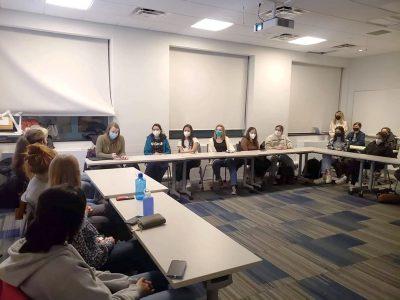From superheroes to celebrities, we’ve all had somebody we could look up to or aspire to be. But for women in STEM, finding these idols in a male-dominated field can be challenging.

Students at Boston University’s Undergraduate Women in Science and Engineering aim to overcome this obstacle by creating a community filled with role models for underrepresented individuals.
“Our official mission is to provide a community and support network for all those who support women in STEM at BU,” Artemis Margaronis, co-president and a junior in the College of Engineering, said.
Margaronis said there weren’t many girls in her STEM classes. For underrepresented groups, building a sense of community is key to feeling welcomed and successful, she said.
“It was just hard the first couple of semesters to find people that really accepted me and allowed me to contribute to conversations,” Margaronis said. “There’s so much collaboration and if you’re not a part of it, it’s very difficult to do well.”
UWISE fosters its community by putting its members “on the pipeline” to both professional development and social activities, Margaronis said.
Currently, they are working toward planning their professional event, which happens every semester and is set for March 30, known as the Faculty Networking Reception, Margaronis said.
“The e-board and some of the members will invite faculty members, largely from the STEM discipline … in CAS and all of the engineering departments,” Linda Doerrer, the club’s faculty mentor, said. “Students can meet the faculty members in a slightly more casual setting.”
Having worked with UWISE for almost 10 years, Doerrer said supporting women in STEM is important and “clearly needed.” The underrepresentation of women across BU faculty poses a big challenge in terms of finding mentorship, she said.
“It can feel isolating,” said Doerrer. “Female students are often looking for female faculty mentors, either looking for role models, for work life balance, how to take on a challenging job … or they just want female mentorship.”
Not having this female mentorship makes it difficult to visualize pursuing a career in STEM, Iris Chun, co-president of UWISE and a junior at the College of Arts and Sciences, said.
“It’s hard … to just not see as many female figures,” Chun said.
UWISE’s mentorship program matches underclassmen with upperclassman members to facilitate questions on which courses to take, research opportunities and building relationships, Margaronis said.
Chun, who said she has aspired to be doctor for a long time, said that UWISE’s mentorship program allowed her to gain insight on classes and develop advice to her mentees.
“They’re just people who will support you no matter what, try your best to give you advice and just be there along the way for you,” Chun said. “I’m very glad to have this role.”
Margaronis said that her mentor introduced her to the research lab she works at currently.
“I’ve been working in a lab for about a year and a half in Biomedical Engineering and the … principal investigator, so that’s like the professor that leads the lab, is a woman,” Margaronis said. “I think just having that positive role model has been really positive for me too.”
Undergraduate students have the opportunity to explore what they can do in science, Doerrer said. She also advocates for everyone to “absolutely” try it and ask what one can do in science.
“It never hurts to try, you won’t ever know until you do,” said Chun.
























































































































